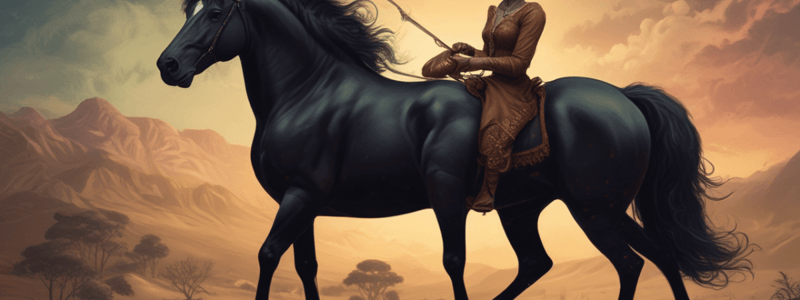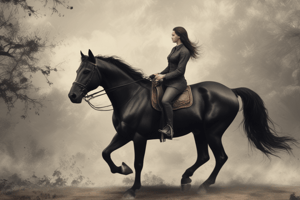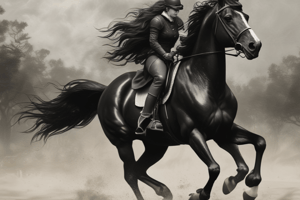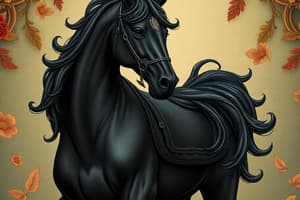Podcast
Questions and Answers
What was beside the meadow?
What was beside the meadow?
- A large pond
- A running brook
- A master's house
- A plowed field (correct)
What did the author do at night when young?
What did the author do at night when young?
- Played with the other colts
- Lay down close by mother (correct)
- Grazed in the meadow
- Ran by mother's side
What were the other colts in the meadow?
What were the other colts in the meadow?
- Farm horses
- Racing horses
- Ponies
- Cart-horse colts (correct)
Why did the author's mother want to talk to the author?
Why did the author's mother want to talk to the author?
What did the author and the other colts do together?
What did the author and the other colts do together?
Where did the author's mother go in the daytime?
Where did the author's mother go in the daytime?
What was the name of the narrator's mother?
What was the name of the narrator's mother?
What was the master's attitude towards the horses?
What was the master's attitude towards the horses?
Why was Dick, the plowboy, fired from the farm?
Why was Dick, the plowboy, fired from the farm?
What did the master give to the narrator as a treat?
What did the master give to the narrator as a treat?
What was the narrator's color when it was a colt?
What was the narrator's color when it was a colt?
Who looked after the horses on the farm?
Who looked after the horses on the farm?
What was unique about the colts in the meadow?
What was unique about the colts in the meadow?
Why did the narrator's mother call it to her one day?
Why did the narrator's mother call it to her one day?
What was near the grove of fir trees?
What was near the grove of fir trees?
What did the narrator do in the daytime when it was hot?
What did the narrator do in the daytime when it was hot?
What happened when the narrator was old enough to eat grass?
What happened when the narrator was old enough to eat grass?
What did the narrator and the other colts do together during play?
What did the narrator and the other colts do together during play?
What was the mother's advice to the narrator?
What was the mother's advice to the narrator?
What would the master give to the narrator and its mother as a treat?
What would the master give to the narrator and its mother as a treat?
Why was Dick, the plowboy, caught by the master?
Why was Dick, the plowboy, caught by the master?
What was the name of the man who looked after the horses?
What was the name of the man who looked after the horses?
What did the master do to Dick after catching him?
What did the master do to Dick after catching him?
How did the mother react when she saw the master at the gate?
How did the mother react when she saw the master at the gate?
What was special about the colts that the narrator played with?
What was special about the colts that the narrator played with?
What did the narrator do in the daytime when it was not hot?
What did the narrator do in the daytime when it was not hot?
What was near the bottom of the meadow?
What was near the bottom of the meadow?
Why did the narrator's mother call it to her one day?
Why did the narrator's mother call it to her one day?
Where did the narrator's mother go in the daytime when the narrator was old enough to eat grass?
Where did the narrator's mother go in the daytime when the narrator was old enough to eat grass?
What did the narrator and the other colts do together during play?
What did the narrator and the other colts do together during play?
What was the name of the narrator's mother?
What was the name of the narrator's mother?
What was the master's attitude towards the horses?
What was the master's attitude towards the horses?
What did the master do to Dick when he caught him?
What did the master do to Dick when he caught him?
What was the result of Dick's actions towards the horses?
What was the result of Dick's actions towards the horses?
What was the characteristic of the narrator's grandmother?
What was the characteristic of the narrator's grandmother?
Who looked after the horses on the farm?
Who looked after the horses on the farm?
What was the main difference between the narrator and the other colts in the meadow?
What was the main difference between the narrator and the other colts in the meadow?
What was the master's approach to the horses under his care?
What was the master's approach to the horses under his care?
What did the narrator and its mother do when the weather was hot?
What did the narrator and its mother do when the weather was hot?
What did the narrator's mother advise it to do?
What did the narrator's mother advise it to do?
What was the narrator's diet when it was young?
What was the narrator's diet when it was young?
What did the plowboy Dick do to the colts?
What did the plowboy Dick do to the colts?
What was the purpose of the nice warm shed near the grove?
What was the purpose of the nice warm shed near the grove?
What was the result of the master's intervention in the situation with Dick?
What was the result of the master's intervention in the situation with Dick?
What was the narrator's mother concerned about during the rough play?
What was the narrator's mother concerned about during the rough play?
What was special about the narrator's family?
What was special about the narrator's family?
What was the view from one side of the hedge?
What was the view from one side of the hedge?
What did the narrator do at night when it was young?
What did the narrator do at night when it was young?
What did the narrator's mother do on market days?
What did the narrator's mother do on market days?
What was the master's attitude towards the narrator's mother?
What was the master's attitude towards the narrator's mother?
What was the characteristic of the narrator's grandmother?
What was the characteristic of the narrator's grandmother?
What was the master's primary concern for the colts?
What was the master's primary concern for the colts?
Why did the master intervene in the situation with Dick?
Why did the master intervene in the situation with Dick?
What was the relationship between the narrator and its mother?
What was the relationship between the narrator and its mother?
What did the master give to the narrator and its mother as a treat?
What did the master give to the narrator and its mother as a treat?
What was the name of the man who looked after the horses?
What was the name of the man who looked after the horses?
What was the result of the master's intervention with Dick?
What was the result of the master's intervention with Dick?
What was the characteristic of the narrator's mother?
What was the characteristic of the narrator's mother?
What did the narrator's mother do on market days?
What did the narrator's mother do on market days?
What was the location of the shady trees in relation to the pond?
What was the location of the shady trees in relation to the pond?
What was the narrator's primary source of nutrition when it was young?
What was the narrator's primary source of nutrition when it was young?
What was special about the colts in the meadow, according to the narrator's mother?
What was special about the colts in the meadow, according to the narrator's mother?
What did the narrator and the other colts do together during play?
What did the narrator and the other colts do together during play?
Why did the narrator's mother call it to her one day?
Why did the narrator's mother call it to her one day?
What was near the bottom of the meadow?
What was near the bottom of the meadow?
What happened when the narrator was old enough to eat grass?
What happened when the narrator was old enough to eat grass?
Flashcards
Beside the meadow
Beside the meadow
An area of cultivated land adjacent to the meadow.
Young colt at night
Young colt at night
The narrator would lie down close by its mother.
Colts in the meadow
Colts in the meadow
They were all cart-horse colts.
Mother's intention
Mother's intention
Signup and view all the flashcards
Colts' playtime
Colts' playtime
Signup and view all the flashcards
Mother's daytime
Mother's daytime
Signup and view all the flashcards
Narrator's mother
Narrator's mother
Signup and view all the flashcards
Master's attitude
Master's attitude
Signup and view all the flashcards
Dick's dismissal
Dick's dismissal
Signup and view all the flashcards
Master's treat
Master's treat
Signup and view all the flashcards
Colt's initial color
Colt's initial color
Signup and view all the flashcards
Caretaker of horses
Caretaker of horses
Signup and view all the flashcards
Mother's advice
Mother's advice
Signup and view all the flashcards
Mother's summons
Mother's summons
Signup and view all the flashcards
Master's treatment of horses
Master's treatment of horses
Signup and view all the flashcards
Hot weather activity
Hot weather activity
Signup and view all the flashcards
Young colt's food
Young colt's food
Signup and view all the flashcards
Result of the master's intervention
Result of the master's intervention
Signup and view all the flashcards
Study Notes
Childhood Memories
- The narrator's first memory is of a large pleasant meadow with a pond, shady trees, and a running brook.
- The meadow was surrounded by a plowed field, a gate, and a master's house.
- The narrator lived on their mother's milk, running by her side during the day and lying down close to her at night.
Mother's Advice
- The narrator's mother advised them to grow up gentle and good, never learning bad ways.
- She told the narrator to do their work with a good will, lift their feet up well when trotting, and never bite or kick even in play.
Family Background
- The narrator's father had a great name in the area, and their grandfather won the cup two years at the Newmarket races.
- The narrator's grandmother had the sweetest temper of any horse.
Life on the Farm
- There were six young colts in the meadow, older than the narrator, and some were nearly as large as grown-up horses.
- The narrator used to run with the colts, having great fun, but sometimes experiencing rough play.
- The master was a good, kind man who gave the horses good food, lodging, and kind words.
Incident with Dick
- A plowboy named Dick would sometimes come into the field to pluck blackberries and have "fun" with the colts by throwing stones and sticks to make them gallop.
- One day, the master caught Dick in the act and gave him a box on the ear, telling him to leave the farm for good.
Caretakers
- Old Daniel, the man who looked after the horses, was just as gentle as the master, ensuring the horses were well off.
Studying That Suits You
Use AI to generate personalized quizzes and flashcards to suit your learning preferences.




